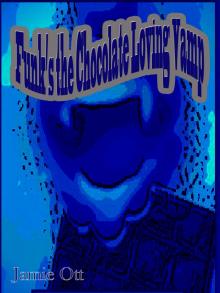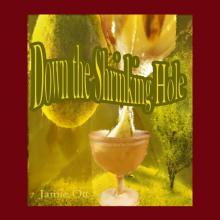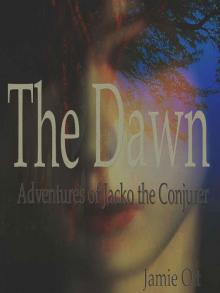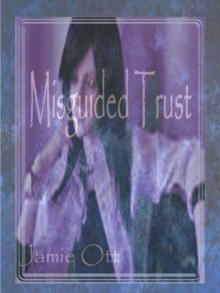Langley's Blues Read online
Page 2
CRUNCH! CRUNCH! CRUNCH!
PSSSSH, sprayed more wood.
Tatia was too scared to scream. Bruce’s eyes were bugged out, and Jack jumped each time a new hole appeared.
Bruce and Jack watched the trail of magically appearing holes, all the way to the brick fireplace, where it hit iron behind the wall, and made a high DING!
The holes stopped appearing.
The waves of the fire flickered again. Bruce shrieked and yanked at Tatia’s arm.
Tatia uncovered her eyes and asked, “What?”
“Look!” said Bruce, pointing at the hall.
Floating toward the living room was a whited out ghost of a man. It had round eyes and an oblong opened mouth that made it look like a lost soul.
The steam whistle blasted through the air again; they grabbed their ears.
“What’s in its mouth?” asked Tatia. “Ewww!”
A black, shiny substance was turning over its tongue; it leaked over his lips and bled all the way down his shirt.
Slowly, it levitated closer and closer to them, as more sludge goo-ed out.
Jack looked about the room for a quick solution. His eyes settled on the fire poker.
He grabbed it, raised it skyward, and slashed it down through the ghost.
Instantly, it disappeared, leaving a wisp of white in the air that slowly dissolved.
“How did you know to do that?” asked Bruce.
“I watch T.V.”
Tatia ran to her sleeping bag and began rolling it up.
“What are you doing?” asked Bruce.
“I’m getting out of here.”
“You can’t leave! This is a great place! No one’s been here in forever. We can probably spend the winter here.”
“What if it comes back?”
Jack handed her the fire poker.
“If you get scared, swipe the ghost with the poker,” he said.
“I think he’s right,” said Bruce. “You know how it is. We could search for weeks, and never find a place like this. We just have to learn how to live with a ghost.”
Get Comfortable
Chapter 2
The next morning, they made it a priority to bathe. Most of the time, they were forced to wash with the ice cold water of Pickley Hills Park bathrooms.
Jack and Tatia heated pots of water by setting them on the fireplace while Bruce snuck out to find breakfast.
When he returned, he had Captain Crunch and a carton of orange juice.
“Did the neighbors’ see you?” asked Tatia.
“No, I was real careful going out and coming in.”
“No milk?” asked Jack, whose hair was still wet.
He walked over and set the large pot of water on the fireplace.
“I didn’t realize it was juice until I was halfway down the block. The clerk was onto me, and the only way I got away with these was because a couple of Joey’s kids came in and pepper sprayed him in the eyes.”
“That’s terrible!” said Tatia.
She was sitting with her back to the fireplace, hoping her wet hair would dry quickly, as the house was still very cold.
Joey was the city’s bully.
In his father’s warehouse on the other side of town, he resided as an unofficial magistrate to a host of about a hundred kids.
In exchange for letting them stay there, the kids provided public services, such as window washing, pick pocketing, shop lifting, and sometimes burglary.
The kids would give him all their earnings, in exchange for his ‘protection’ and his silence.
“Well, you want to eat, don’t you?” asked Bruce sarcastically.
Tatia walked to the kitchen and brought back a couple bowls and spoons.
“Yeah, well, just don’t let them do us any more favors,” said Jack. “As it is, I don’t know how I’m gonna get my guitar back.”
When Tatia got her nose broken, Jack and Bruce went to Joey for help. The hospital wouldn’t admit her without health insurance or an up front payment.
Jack gave Joey his father’s 1952 Roy Buchanan Fender Telecaster, in exchange for the $1,000 they needed to get Tatia’s nose fixed.
“I’m sorry, Jack,” Tatia said. She grabbed the cereal and juice, poured them into the bowls, together.
“You don’t have to apologize, Tatia. I don’t blame you, but I’ve got to get it back. It’s the only thing my father ever gave to me, and it’s worth a lot more than $1,000.”
“Like how much?” asked Bruce sounding excited.
“I don’t know. It’s just what my father told me before he died, but I won’t sell it – not for a million dollars.”
“Well, today’s Tuesday,” said Bruce. “I’m gonna mow Mrs. Henderson’s lawn, so that’s $20; tomorrow, I’ve got Mr. Bracket, so that’s another. I’ll go through the neighborhood, today, and try to drum up some more business, too.”
“Right,” Tatia chimed in. “Today I’m going to school. I’ll raid the kitchen and get food supplies; hopefully enough for the week, so that’s one less expense. Then I’ll give blood, that’s $20, and Mister Crane on Milton Street said he’d pay me for my newspapers today, so that should be another $20.”
Sounding downtrodden, Jack said. “I don’t have anything lined up today. What am I gonna do?”
“Wash windows, of course,” said Tatia.
“Great. Maybe I’ll make five bucks, if I’m lucky.”
“Jack, five is five; you can’t give up,” Tatia said sympathetically.
“Maybe we should go and work for Joey?” Bruce suggested, taking a bite of his cereal.
“No,” said Jack. “We shouldn’t get any more mixed up, with him, than we already are. If there’s one thing I know about Joey, it’s that he doesn’t like to let go of his debtors. He’ll always come up with an excuse to pull you back in, and make you his slave.”
“I’ve got an idea” Tatia said as she munched. “You should scavenge this house today. We don’t know what’s upstairs in the attic. For all we know, there could be valuables.”
“Great idea,” he said. “I’ll go through all the boxes, and even the kitchen. We’ll sell what we can.”
They flinched as a sudden noise blasted.
Waaaaaahhh!
The sound was like the far away, prolonged horn of a train.
“Aah!” Tatia jumped in her seat, nearly spilling juice over the side of her bowl.
The wind around the room blew again, rattling the curtains.
The ghost appeared again. This time, he looked angrier than before. A copious amount of sludge issued from his mouth as he made the floorboards rattle, and the couch levitate.
Jack ran for the poker. The ghost, seeing him with it, backed away and around the room.
WAAAAHHH! the ghost wailed louder.
Jack chased him around the couch several times before he gave up and disappeared, leaving behind another wisp of white.
Roy Buchanan
Chapter 3
After breakfast, they went their separate ways: Tatia to school, and Bruce to mow lawns.
With a trash basket, a bucket of hot water and towels, Jack went up to the attic.
The air was thick with dust. He choked on the scent of recent animal urine.
“Achoo! Ugh…” he heaved.
He walked to the broken window, stuck his head out and breathed in deeply. Then, he opened the two other windows, allowing a breeze of fresh air to sweep the room.
When Jack was a kid, his father told him all about Roy Buchanan and the Potato Peeler, Bobby Gregg.
“The best darned musicians of all time!”
He grabbed the broom and stuck the wide end with the bristles into the largest cobweb that was attached to the couch. Jack twisted the broom, rolling the web into a huge wad. When he got as much of it as he could, he used his fingers to pry it off, and dropped it into the trash basket.
Jack didn’t meet his father until much later. His mother told him they’d me
t up in a moment of fiery rock ‘n’ roll passion.
That was about all he needed to know. He was fine without his father. Never, did he ask any other questions about him or why he wasn’t around, until one day when he got a letter in the mail.
‘Dear Jack,
I’m your father.
I’m dying. Come visit me.
Your Dad,
John’
That was it; that was all it said.
No I’m sorry for being absent; sorry I never sent you a card; sorry I never bothered.
Nevertheless, his mother insisted he go. She printed him a ticket, packed him a lunch and took him to the train station.
“In case of an emergency,” she said as she shoved a wad of cash into his front jeans pocket.
When he arrived at his destination, his father stood there looking like a grim reaper. He was dirty, wheezy-breathed, and sleazy looking.
John moved Jack into the spare room that would have been his nurses, but he didn’t need or want around the clock care, yet.
Every day with his father was torture. Jack tried not to fall asleep as he rambled on and on.
On more than one occasion, he wanted to tell is father to shut it, so he could have some peace and quiet. The man could talk for hours, going over the same details, repetitively.
Jack said nothing, though, out of respect for his dying father. But in all the days, he never stopped talking about his time as a musician.
Two weeks after Jack moved in, his father got worse. Instead of just dying, like Jack anticipated, he wasted away. He got skinnier and skinnier, until he couldn’t walk.
Jack, then, stayed by his side, and listened to his ramblings as he lay in his hospice bed, which had been moved into the living room.
“Buchanan made his distortions without a pedal,” he remembered his father shouted at him, over the television commercial. “These days, musicians have it too easy; these days, guitars are made of tin and fiber board,” he’d scoff. “No wonder they can’t make music worth a darn. They don’t have to work for it!”
One night, his father told him that no one in his family liked him very much. They called him a bum, reckless and impulsive, only cared about making music and nothing else.
“They’d say different if I was Mick Jagger or Mc Cartney, or Lennon,” he coughed through phlegm. He grabbed a tissue and wiped his mouth.
“People, they love music, but they don’t want to suffer the sight of a musician. They turn on the radio, but they don’t hear the music. Most of the time, it’s just words they hear, and they don’t even understand them, not really. They hear a real musician playing next door, trying to perfect his craft, and they tell him to shut it – even call the cops. People are fakers.”
He reached over for his smokes, and tapped one out.
“Oh but son, that night in the Ozark, we knew we were headed for success. We knew we were good. The people loved us, but then Roy showed his true colors. He showed what a traitor he was, and it ruined my life.
Me and Roy, we were best friends, but he was half wolf-half man, just like they said. Roy didn’t get along too well with others, neither.”
He took a deep inhale.
“HOOOOooooo,” he blew loudly. “Roy had one guitar: a 53 Telecaster nicknamed Nancy. It’s in a museum, but what most people don’t know is that he had another: A 52 Tele.
Sure, Nancy was nice, but 52 was as perfect as it got. That was the year they perfected it. The year after, they cheapened the Fender Telecaster. Not only does the 52 allow both pickups to be used at the same time, but look at this: Slot heads, not screws!”
He stopped a moment, as Jack examined the guitar.
“Anyway, Roy got into it with one dude over creative differences. He felt they should have been doing what he told them.
Now, I was just protecting my friend. Roy wasn’t much of a fighter, like he thought he was. He was just scary looking, that’s all. This dude was more than I could handle though. So while I was getting the crap beat out of me, he made off with this.”
He indicated the guitar by tapping it with his finger.
“That was the night I went to jail. The dude was real well known, real respected; the law was on his side from the get go. He was a church goer, and it was the Bible belt. I was just protecting myself; I wasn’t drunk and messing up my life, like people like to say.”
He paused a moment, to wrestle back the emotion in his voice.
“Seven years, I did over that. Should’a been ten, though. Still, I never got back on the train after that. It was like my time was done. No one wanted to give me a second chance.
And, yet, sometimes I blame myself for never making it. I was broken, when I left prison. Hell, I didn’t even touch a guitar the entire time that I was in there.”
He took another drag and said, “Many years later, I caught up with Roy at the Rockaplast show. He thought I just wanted to say ‘hi.’
All he wanted was to get away from me because he knew that if he hadn’t left me, I’d have never killed that guy and gone to jail. We were supposed to be tight. Roy knew he’d betrayed me.
Anyway, he pretended to be glad to see me, and then he made some lame excuse and left the room.
That was the night I stole my ‘52 tele from him, haha. I thought it was the Nancy, and I didn’t realize it wasn’t until later. Still, I heard that he was downright angry, and that he was gonna find me and put a bullet in me. But he died instead.
Oh but it was me, the Potato Peeler, and Roy. We were good and we were tough. But that was back in ‘52. Waaay back when.”
…………….
Jack listened to his father’s incessant ramble for several weeks, until the cancer took him into a coma.
When he didn’t wake after several days, the nurse said it was probably permanent.
Relieved and thinking he could finally go home, he called his mother that very night. To his surprise, she insisted that he stay with his father until the very end.
Violent anger welled up inside him. He didn’t want to spend another moment in that house.
She didn’t understand what a torturous experience it had been for him to spend each day with the foul scents of his dying father.
He knew he should be ashamed for feeling the way he did, but he’d have given anything to be anywhere else.
When Jack protested, she insisted that he needed to be there for him, in case he woke.
“He’s your father!” she shouted at him. “How could you be so selfish?”
He was going to do as his mother wished.
His mind changed when a few a days later, the nurse came in and started instructing him on how to change his diaper and sponge bathe him.
He just couldn’t do it.
The man was a stranger to him. Why should he do for his father, what he never did for him as a baby?
So that night, Jack grabbed the 52 Fender Telecaster, and left.
Every day, he felt guilty about it, too. That first night away, he wandered to the Pickley Hills Park.
Sitting on the moist, wet bench, he pulled the telecaster from its ugly brown velvet case.
It was obvious that the guitar was old. The alignments were funny; the spacings were off.
He ran a chord. It felt nice and warn, the way the strings resisted and pulled back.
Unimpressed, he put the guitar back in its case. He never touched it again.
A whole week passed with him sleeping at the Pickley Hills Park, and wandering the streets. Nights later, he ran into Bruce, who used to spend time there, too.
They’d talk and watch the families come to the park and have parties. Sometimes, other teenagers would come by, too, though not for good times: more or less, good time trouble.
Bruce was the first person he’d talked to about his father. He was a good listener, too.
After Jack had finished talking, Bruce said, “Jack, you have to go back. Your father is not you, and you
have to be better than him. He ran away, and now you’re running away.”
Bruce gave Jack the kick in the pants that he was looking for. It gave him the courage to go back to his father’s cottage at the hospice.
He intended to apologize. From that point on, he was going to do whatever to make his death easy.
But when he got back to the cottage, it was empty. He knocked on the door, repeatedly.
Finally, he walked to the side of the house and peered through the sliding glass window.
No one was there. The living room was completely emptied of all furniture.
At that moment, a buzzing feeling erupted on the hair line of his forehead, and traveled down his face, back and body.

_preview.jpg) Champagne Confines (Vampin XX)
Champagne Confines (Vampin XX)_preview.jpg) Vampin Box Set (Books 10-15)
Vampin Box Set (Books 10-15) Langley's Blues
Langley's Blues Funk's the Chocolate Loving Vamp
Funk's the Chocolate Loving Vamp_preview.jpg) Vampin Box Set (7-9)
Vampin Box Set (7-9) Blackthorn: In the Tween
Blackthorn: In the Tween A Very Blakely Christmas 2012
A Very Blakely Christmas 2012 Maternal Absence
Maternal Absence_preview.jpg) Remembering (Vampin Book Series #17)
Remembering (Vampin Book Series #17) Down the Shrinking Hole
Down the Shrinking Hole Adventures of Jacko the Conjurer
Adventures of Jacko the Conjurer Adventures of Jacko the Conjurer: The Dawn
Adventures of Jacko the Conjurer: The Dawn_preview.jpg) Beheaded (Vampin Book Series #8)
Beheaded (Vampin Book Series #8) Misguided Trust
Misguided Trust